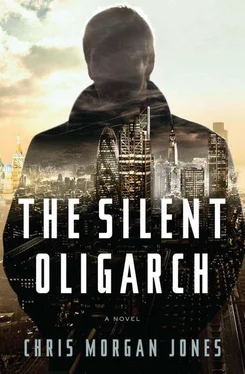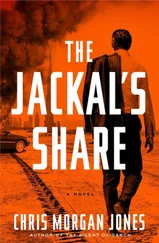Against the far wall of the ballroom, looking out onto the main room in its own screened space, was a small stage or dais on which stood a microphone. The family walked up onto it and Galinin addressed the crowd.
“Ladies and gentlemen, welcome. I would like to thank you all for being here. Today we celebrate the birthday of a very special young lady”—much applause and cheering—“who is now six years old. I can hardly believe it. Maria Sergeevna, as beautiful as a princess in her birthday dress, is six years old today.” Galinin waited for a second burst of applause. “On her behalf I would like to invite you to enjoy our party here. I think maybe it is the best tea party ever thrown in Moscow!” Another pause, and much clapping. “We have tea—of different strengths!—we have cakes, we have music and entertainment. In a moment I shall leave you to enjoy yourselves but first of all I have one very important duty to perform: to give Maria Sergeevna her birthday present.” At this he ruffled his daughter’s hair, slightly dislodging her tiara. People at the back of the crowd craned for a look at her expectant face.
In the wall behind the stage, a door opened, and through it stepped a man wearing the costume of a circus ringmaster. He held a thick rope in his right hand and at the other end of it, slowly emerging in the doorway, was a crocodile, perhaps seven feet long, lumbering forward deliberately on its angular legs. A gasp went up in the front rows and several people took an unconscious step backward. Lock watched as the ringmaster and the crocodile mounted the stage and the ringmaster passed the rope to Galinin.
“From Asia, a beast for my beautiful girl!” shouted Galinin to the crowd, eschewing the microphone. “His name is Gena! What do you think of him, my darling?” Maria looked at the animal with something between fear and delight. “Do not worry. He will not hurt you. He is only young.” He offered Maria the rope but she hesitated, looking up into his eyes for reassurance; then she turned abruptly away and pressed her face into her mother’s skirt. Guests laughed, and so did Galinin, who took up the microphone again. “It is right for the princess to be afraid of her beast. Do not worry, my dear—he will live with us and you will come to know him. Now, is there any man here brave enough to wrestle Gena?” He laughed, and his guests nervously followed. “Sorry, Gena, no takers today. Thank you anyway. Say good-bye to your friends.” To new applause the ringmaster took the crocodile down the steps and away.
“Now!” said Galinin, clapping his hands together, “let the party begin! Enjoy yourselves, please!” As the applause rose once more he knelt by Maria, took her by the arms and gave her an emphatic kiss on each cheek. As the audience dispersed Lock saw the little girl, her eyes red but not crying, hugging her father and being coaxed into a laugh.
“Thirty minutes,” he said to Oksana, “at most. Just let me congratulate Sergei.”
“Is she their only child?” said Oksana, still watching the stage.
“I think so, yes. Why?”
“I wonder what they will give her next year. I’m going to find some food.”
Lock watched her go. There was now a press of people around Galinin. He found a drink and stood on the edge of the group, as if waiting in line.
One day he would give a speech for Vika, at her eighteenth birthday, perhaps her wedding: a short, perfect speech that would let her know how proud he was and how much he loved her. At her last birthday party—no, the one before: the last one he had managed to attend—he had stood in a room full of screaming girls in party dresses and felt stiff and remote, making stilted conversation with other parents while Vika, alight with excitement, watched a magician conjure doves from a velvet bag. She was seven that day, and Lock had brought her a beautiful winter coat that Marina had said she would adore. In the end it was spring before he was in London again, and he never saw her wear it.
Someone touched his arm and asked him whether Konstantin was at the party. No, said Lock; urgent business at the ministry. The truth was that Malin didn’t like parties, still less the parties of not wholly important people, and preferred to keep his distance from his commercial partners in public. This was why Lock was here, to pay respect on his behalf. He and this man, an oil company executive, a Russian, talked for some time about the industry, Lock keeping a distracted eye on his target. But no matter how swift Galinin was with each guest, the queue never seemed to shorten as important Russians, and brazen ones, simply went straight up to him and shook his hand. Lock’s acquaintance left to talk to someone else and Lock was left alone, not for the first time regretting his reserve. He could see Oksana halfway across the room talking to Galinin’s right-hand man, who was improbably young and clean-cut.
He felt his phone vibrate in his pocket. He took it out and saw that it was a London number calling.
“Hello?” he said, moving away from Galinin’s little congregation. “Hold on, it’s very loud in here. Let me step out. Hold on.” He walked quickly across the room and out into the lobby.
“OK. Sorry about that. Go ahead.”
“Richard Lock?”
“Yes, speaking.”
“This is Gavin Hewson of The Times in London, Mr. Lock. I was wondering whether you’d like to make a comment on the lawsuit that’s been brought against you in New York. Do you mind if I ask you a few questions?”
Lock hesitated. He was terrified of talking to the press. Journalists, he believed, had only one intention, to expose him to public shame and humiliation. His PR people had given him some advice about how to deal with them: be relaxed, be polite, and give them something that they want, not everything but something. Polite perhaps he could manage.
“To be honest this isn’t a very good time. I’m at a social gathering.” A social gathering? Lock wondered as he said it whether he could sound less relaxed. “And it’s getting late in Moscow. Could I call you after the weekend?”
“I’d rather speak now if we could,” said Hewson. “We have a piece appearing in tomorrow’s paper and I was hoping for a comment.”
“Tomorrow?” Fuck, thought Lock. Fuck. Malin hated surprises like this. “In London?” Christ. Where else would it be published?
“Yes.”
“Look, is there any chance you could set it back a day or two? I’d love to make a comment but I should speak to my PR people first. You understand.”
“I’m afraid not. It’s all blocked out. Can you tell me for a start what you make of Mr. Tourna’s allegation that Faringdon Holdings is a money-laundering operation?”
Lock had been pacing the hotel lobby but at this question he made his way to the entrance and went out into the cold. What do I make of the allegation? he thought. Well, it’s completely true, of course. How could it be anything but? I’m amazed no one has ever challenged it before.
“You’re going to have to speak to my PR people. I’ll have them call you.”
“So you’re not prepared to make a comment yourself?”
“No, sorry.”
“So just no comment?”
“Yes.”
“Who does your PR?”
“Aylward Associates.”
“Who? Martin Cassidy?”
“Yes.”
“Thanks. I’ll give him a call.” Hewson hung up.
Lock put his phone back in his pocket and sat down on the steps of an old office building opposite the hotel. He was going to have to get much better at answering these questions. On an impulse he stood up, walked back into the hotel, went to the concierge’s desk and asked him where he could buy cigarettes. At the bar on the top floor he bought twenty Marlboro Reds and some matches, stepped out onto the hotel’s roof terrace, tapped a cigarette from its soft pack and lit it, leaning on a railing and looking out over Moscow.
Читать дальше












